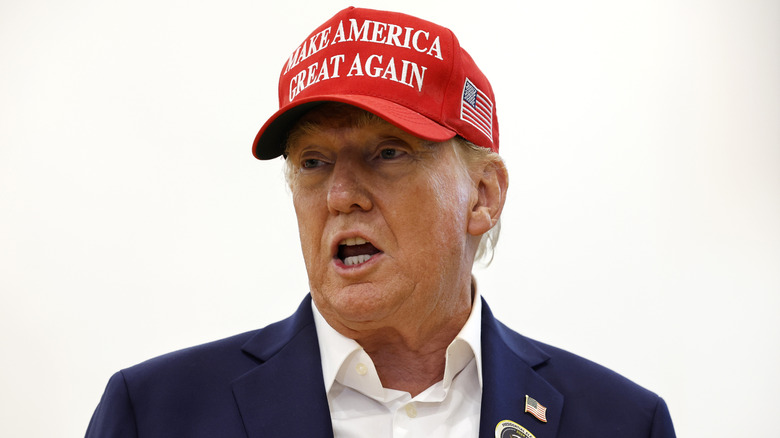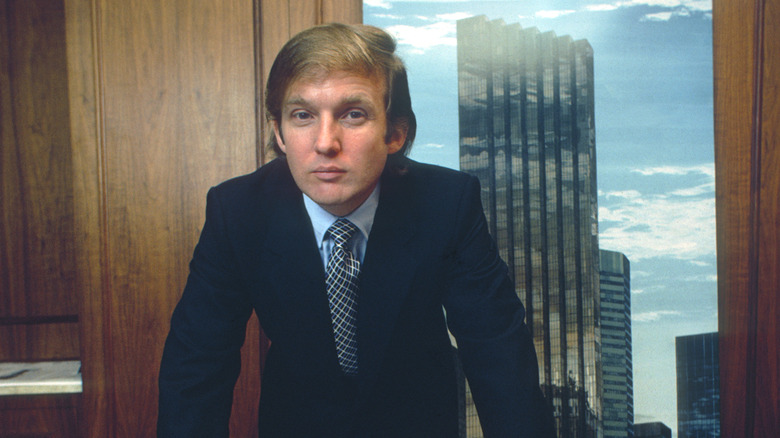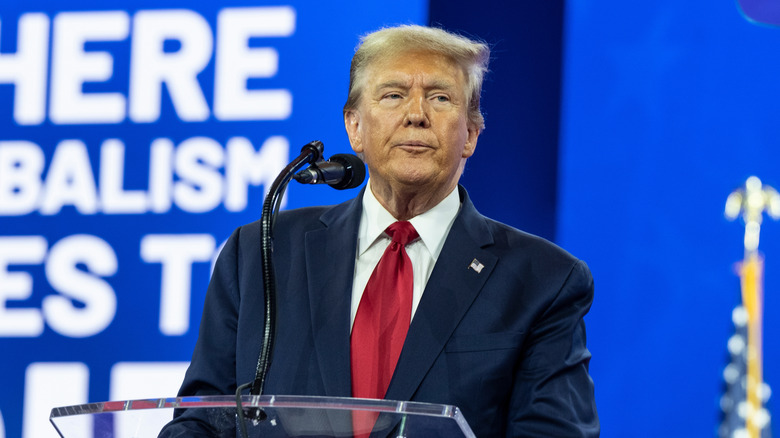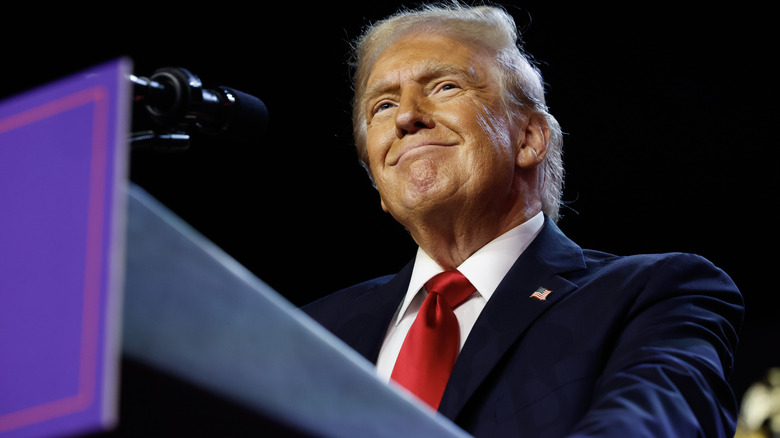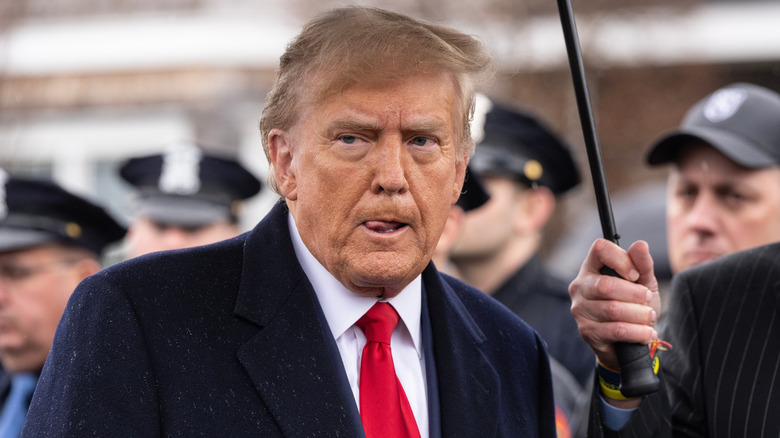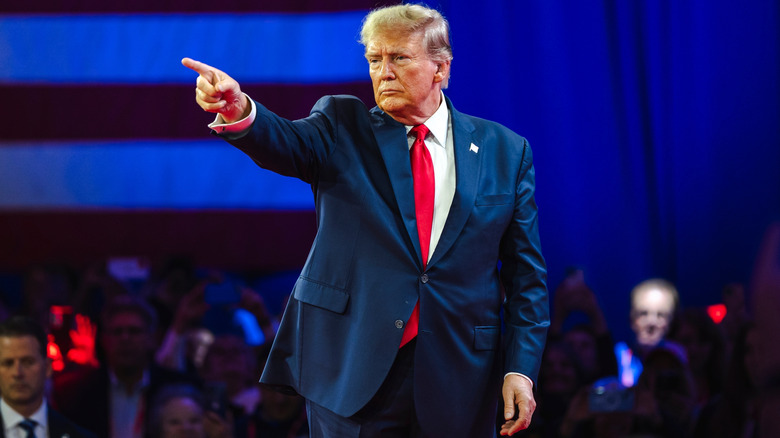Trump's Biggest Controversies In New York
Born and raised in New York, Donald Trump's ties with the state run deep. The GOP politician famously grew up in Queens and even attended New York's Fordham University for two years. But in 1966, at age 20, he transferred to Pennsylvania's Wharton School of Finance. Two years later, a fresh degree in hand, he went back to New York, ready to work in his father's company. This marked the beginning of Donald's professional real estate career.
In three short years, he rose from a green hire to the president of the Trump real estate business, which focused heavily on residential properties in Staten Island, Brooklyn, and Queens. But Donald had big dreams — he wanted to take the company to new heights.
However, as the public would find out many years later, Donald Trump, like his father, Fred Trump, was so focused on achieving his goals that he used many questionable tactics to get what he wanted done. In fact, just two years after becoming president of the business, he engineered his first New York scandal.
Donald Trump paid a hefty fine for ignoring New York's Fair Housing Act
In 1972, Donald Trump was no doubt reveling in his achievements as a 26-year-old business mogul. However, unknown to him, he was being investigated by New York City's Human Rights Division. It all began when the organization received complaints that Black applicants were being denied housing by the Trump Management solely due to their race. This was a big deal, given that the Fair Housing Act of 1968 had explicitly made this discrimination illegal.
To investigate, the Human Rights Division devised a simple strategy: sending one Black and one White person to view the same apartment at different times. While the Black applicant was informed that the apartment was no longer available, the White applicant was welcomed and given a tour.
When the employee was questioned about this discrimination, his response was telling: "Well, I'm only doing what my boss told me to do — I am not allowed to rent to black tenants." This led to one of the Trump family's biggest lawsuits that dragged on until the government offered a settlement. In exchange for a substantial amount and an agreement to advertise to Black audiences, the Trumps didn't have to plead guilty.
Donald Trump racked up a ton of debts in New York City
By mid-1970, Donald Trump was facing some serious money problems. It turned out that his four years of college and three years of working experience weren't enough to make him a successful president of a company. Thanks to a series of poor decisions, he was spending a ton of money that he wasn't making back. By 1978, Fred Trump stepped in to save the day and got his son $35 million in loans from Chase Manhattan. But Donald soon spent it all on failed ventures and had to borrow even more.
Just two years later, Fred, once again, secured loans of almost $8.5 million for his son. The New York Times reports that the financial safety net Fred Trump provided included more than $60.7 million in loans. And in several cases, Donald wasn't even responsible for paying the interest. For context, that $60.7 million is about $140 million today. Donald would eventually file for bankruptcy at least four times between 1991 and 2009.
Trump University in New York turned out to be a massive scam
In 2005, Donald Trump announced "Trump University," an avenue for him to share his real estate expertise. But, unlike traditional universities that offer academic degrees, teaching, and research facilities, Trump University relied heavily on seminars. Based in New York, the "university" offered its first seminar at no charge. Attending earned you a spot in a three-day seminar — this time for $1,500. Completing that unlocked the "opportunity" to purchase a mentorship program, which cost anywhere from $9,995 to $34,995. These programs promised access to an instructor directly chosen by Trump to guide you on your real estate journey.
If this sounds like a Ponzi scheme, you're not too far off. Although attendees weren't paid to recruit others, they were vigorously marketed to. A later investigation would reveal that marketers were trained in manipulative sales techniques through a roadmap that painted the students as cash cows.
The red flags wouldn't have been entirely damning if Trump University had delivered on its promises. Spoiler alert: it didn't. Over 6,000 students joined a lawsuit against the institution. They alleged that the instructors offered information readily available online and even taught tactics that were illegal in certain states. After a five-year battle, the case was settled with Trump agreeing to pay a $25 million fine, all without admitting guilt.
Trump's retaliation against the New York Times backfired
Donald Trump has a long history of suing media outlets, often targeting New York publications. One of these lawsuits resulted in quite a controversy for him and his legal team. A year after losing his reelection, he took The New York Times and several of its reporters to court over an article based on information provided by his niece, Mary Trump. The article exposed that Donald had paid only $1,500 in taxes between 2016 and 2017. It also revealed his questionable deductions, tax strategies, and generally sketchy financial dealings.
Donald hired Alina Habba to represent him and claimed that the New York Times had conspired with his niece simply out of spite. However, in 2023, Judge Robert Reed dismissed the case, stating there was no legal basis to sue. Reed added that the anti-SLAPP law was "specifically designed to prevent plaintiff (Trump) himself from filing lawsuits like this one to retaliate against journalists for their reporting." In the end, Judge Reed ordered the businessman to pay $392,638 to cover The New York Times' legal fees.
Donald Trump's Madison Square Garden rally was full of racist comments
Unfortunately, more than 50 years after he was sued by New York City's Human Rights Division, Donald Trump still finds himself surrounded by accusations of racism. One of the most glaring controversies stemmed from comments made at his rally in New York's Madison Square Garden in November 2024. Apart from directing derogatory and sexist remarks at his Democratic opponent, Kamala Harris, one of Trump's speakers took things further by unleashing a series of racist comments.
Comedian Tony Hinchcliffe remarked, "I don't know if you guys know this, but there's literally a floating island of garbage in the middle of the ocean right now. I think it's called Puerto Rico," He also made a crude joke about Black people carving watermelons, knowingly referring to harmful and racist stereotypes.
When Democratic VP pick Tim Walz called out the remarks for being offensive, Hinchcliffe took to X, formerly Twitter, to respond: "These people have no sense of humor. Wild that a vice presidential candidate would take time out of his 'busy schedule' to analyze a joke taken out of context to make it seem racist." In response to the backlash, Donald Trump claimed that he had no idea who Hinchcliffe was and that the rally wasn't racist, but didn't decry or criticize the statements.
